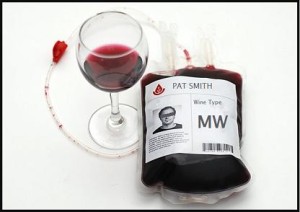Update: I just saw a social media post—in August of 2017—specifically seeking MWs for a contest in China, so the trend continues.
Those times when a Master of Wine visits China, for a tasting or dinner or other event, and criticizes the fascination some consumers in this nation have with Lafite? Oh, irony. Thou art generous.
The claim is people in China have typically bought Lafite as a status symbol—for the label—and have little appreciation of the wine inside the bottle. I’d say this is the same reason they typically invite a Master of Wine. They see them as status symbols—with the MW label replacing Lafite—and have little appreciation of the people holding that qualification.
Take a fictional wine expert, Pat Smith, who consults and writes and leads classes. Pat Smith might be a smart cookie but is unlikely to make the cut as a headliner in China. But Pat Smith MW? That’s a name one might sell to organizers and advertisers of a trade fair or wine tasting or five-star hotel seeking to impress potential dinner guests.
Intriguingly, while interest in Lafite is waning, that in MWs seems to be waxing, turning the focus from wine to blood—someone hurry and create a label called Transubstantiation!—though it is driven more by gatekeepers, the “vintelligentsia” that stands between winemakers and consumers.
The new magazine Le Pan has an edition aimed at the China market and boasts of having no fewer than six MWs on staff. A tasting organized by the magazine Wine in China last year had seven MWs as judges. And given all the talk about China and lucky numbers, it’s only a matter of time before there is an event with eight MWs.
That isn’t to knock the MW as a qualification. Or Lafite as a wine for that matter. They are both of high quality.
I’ve been lucky enough to meet about 40 MWs over the years and found most are interesting or fun, or sometimes both, from Tim Hanni to Jancis Robinson to Andrew Caillard to Liz Thach to Gerard Bassett to Tim Wildman to, well, you get the picture. You don’t become an MW without being highly intelligent, and knowing a great deal about wine, and people who achieve the certification tend to be informative and level-headed. So this isn’t a knock on the qualification in general.
And I realize some might note that there were two Masters of Wine—Robinson and Thach—involved in the Ningxia Wine Challenge I helped organize three years ago. And a third—Caillard—involved in the most recent program. The defense?
We foremost sought people with China experience. Robinson has been visiting wineries here for over a dozen years, starting with her trip to Xinjiang in 2002; Thach has been to numerous conferences in this country; and Caillard is a regular visitor and also associate producer of China wine documentary Red Obsession. They were members of a larger diverse group of judges. And while having a Master of Wine was a bonus, it was not the deciding factor. What was behind that MW label was most important.
What the MW obsession in China underscores is that people are insecure around wine and look to some kind of authority. And given I have heard MWs say they want to make wine more accessible, I doubt putting people on pedestals is the way to go.
We now see a growing number of consumers focusing on what’s inside the bottle rather than what’s on the label. So, too, will they hopefully focus on the messages from wine gatekeepers rather than just the letters behind their names. Again, this is not to knock the MW as a qualification, but it is to say that a healthy wine scene is about what’s in the bottle and what’s under the skin rather than any lofty labels.
Grape Wall has no sponsors of advertisers: if you find the content and projects like World Marselan Day worthwhile, please help cover the costs via PayPal, WeChat or Alipay.
Sign up for the free Grape Wall newsletter here. Follow Grape Wall on LinkedIn, Instagram, Facebook and Twitter. And contact Grape Wall via grapewallofchina (at) gmail.com.
